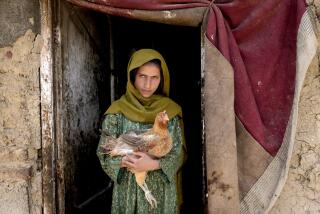Afghanistan’s Lethal Bloom
- Share via
International peacekeepers in Afghanistan have been discussing operating in other cities besides Kabul, the capital, since soon after the Taliban was ousted from power more than two years ago. But they haven’t gotten very far. So when five aid workers were murdered in eastern Afghanistan two weeks ago and a Turkish engineer working on a U.S.-funded road project was killed Friday, colleagues were not surprised. They have watched security go steadily downhill in much of the country that the United States and other nations once considered a priority.
A companion to and in some ways a cause of worsening security is Afghanistan’s increasing opium production. The Taliban drove women from the workplace and girls from schools, enforced its perverted brand of Islam and made public executions a frequent spectacle. One of the very few good things it did was attack opium production, which was nearly stamped out before the U.S.-led war that followed the Sept. 11, 2001, attacks. But now the poppies bloom across the country and opium production is back to pre-Taliban levels, accounting for nearly all the heroin sold across Europe.
A conference later this month to get nations to pledge more money for Afghanistan offers the international community another chance to get serious about a country that has not escaped the possibility of again becoming a failed state. A donor conference two years ago promised $4.5 billion in reconstruction funds for five years; that total now is past $5 billion. But the government of Afghan President Hamid Karzai wants nearly six times that much. Small change compared with the amount earmarked to rebuild Iraq, but probably politically out of the question for Afghanistan.
Britain, almost alone, has said it will more than double its Afghan aid, to nearly $1 billion over five years. Part of that money is intended to eradicate poppy production and give farmers incentives to produce other crops. Getting rid of the poppies takes drug money away from warlords who resist government control by way of militias that are stronger than the fledgling Afghan army.
The warlords haven’t helped stop Taliban attacks on aid workers. Last year 13 aid workers were killed in the country. Nine were killed in less than two weeks last month. Security is so poor that only 1 million of the more than 10.5 million Afghans have been registered to vote. There’s no sense holding national legislative elections until millions more voters can safely register, without fear of reprisal. Iraq continues to distract attention from Afghanistan, and the risks of that distraction are growing. NATO should expand its peacekeeping forces beyond Kabul and the U.S. military should provide protection if those forces are attacked. Security would let international aid workers move more freely to help rebuild a country shattered by decades of war, repression and the menace of Al Qaeda. All of those threats will return unless outside forces quell the current rule by violence.
More to Read
Sign up for Essential California
The most important California stories and recommendations in your inbox every morning.
You may occasionally receive promotional content from the Los Angeles Times.













